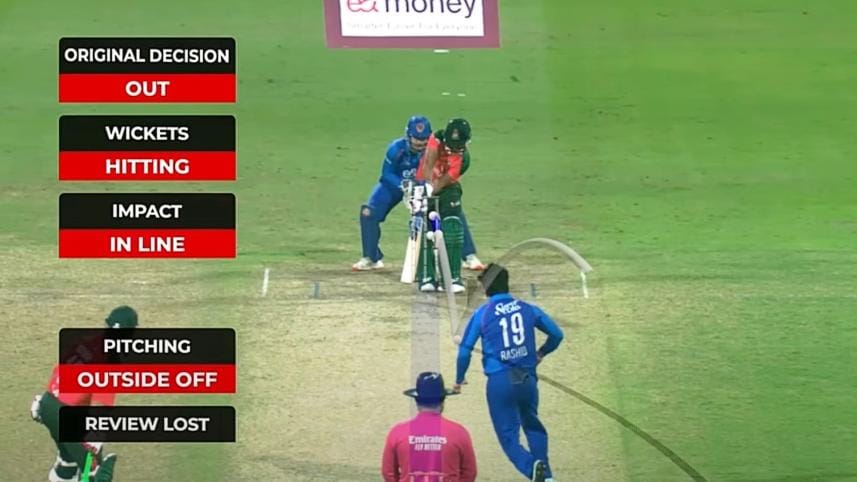Tigers' DRS calls a concern despite Sharjah series win

Bangladesh have earned an unassailable 2-0 lead in the three-match T20I series against Afghanistan in Sharjah, UAE, but beneath the result lay a familiar flaw: reckless misuse of the Decision Review System (DRS).
Beside showing lapses in batting temperament, Bangladesh batters in both matches gave Afghanistan repeated openings by burning reviews unnecessarily, exposing the side to avoidable risks.
The first match, in particular, was a case study in how not to use technology. Chasing 152, Bangladesh were cruising at 109 for no loss in the 12th over when Parvez Hossain Emon reviewed an lbw call against Fareed Ahmad. The decision was clear-cut as ball-tracking confirmed three reds.
A few overs later -- at a critical juncture in the contest after the Tigers lost their top order in a flash -- came the most baffling moment of the series. Shamim Hossain, facing Rashid for the first ball of his innings and with the immediate task of seeing out the last three deliveries of the dangerous leg-spinner's final over, played back and was struck plumb. With Bangladesh needing only 35 runs from 32 balls, five wickets intact, and Nurul Hasan Sohan at the crease, there was no urgency for a gamble.
Yet Shamim, who had already walked halfway to the dugout while the review was in progress -- making his decision all the more baffling -- opted to challenge the umpire's call.
The outcome was inevitable, the ball-tracker verified it, showing the ball would crash into middle and leg. He departed for a duck, leaving his side without a review. That mistake hurt immediately: in the next over, Tanzim Hasan Sakib was given lbw against Noor Ahmad despite a clear inside edge. With no review left, Sakib had to walk, and suddenly Bangladesh were wobbling at 118 for six in the 16th over.
Although they eventually scraped through, Shamim's decision to burn the last review stood out as a cardinal sin that could easily have swung the game.
The trend continued into the second T20I on Friday, where Bangladesh, chasing 148, again wasted reviews. Emon, again in the middle of it, fell lbw to Azmatullah Omarzai in the fourth over after a hopeless review attempt, and later Jaker challenged a plumb lbw against Rashid Khan despite the asking rate being well under control -- below eight in the 11th over.
Both fixtures saw Bangladesh use up all two reviews before the death overs and with at least five wickets in hand. For former captain Mohammad Ashraful, now coaching Barishal Division in the NCL T20, these incidents highlight a deeper flaw. "We're not used to these situations," he said, pointing out that domestic cricket rarely offers DRS. "If players had reviews in domestic matches, their judgment would improve."
He added that too often batters "think they can survive even when they're out," a habit born of inexperience.
Ashraful also stressed the role of exposure and awareness. Regularly watching games on television, he argued, helps players instinctively judge lbw calls. Without that, "they misread situations and rely on hope rather than clarity."
The DRS may be a tool to minimise umpiring errors, but for the Tigers it has become a mirror -- reflecting immaturity and a lack of composure under pressure.




 For all latest news, follow The Daily Star's Google News channel.
For all latest news, follow The Daily Star's Google News channel.
Comments